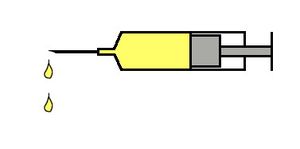Difference between revisions of "Vaccination program"
| (3 intermediate revisions by 2 users not shown) | |||
| Line 1: | Line 1: | ||
[[Image:syringe.jpg|thumb|right]] | [[Image:syringe.jpg|thumb|right]] | ||
| − | Although many infectious diseases, such as hepatitis or influenza, will not be on [[Mars]], there are still some [[microbes|germs]] that can not be avoided completely. Moreover, the [[immune system]] itself may cause problems. Therefore, a '''Vaccination Program''' | + | Although many infectious diseases, such as hepatitis or influenza, will not be indigenous on [[Mars]], there are still some [[microbes|germs]] that can not be avoided completely. Moreover, the [[immune system]] itself may cause problems. Therefore, a '''Vaccination Program''' may need to be defined. |
| + | |||
| + | A complete ecosystem is also likely to includes organism that cause diseases. | ||
==Adults originated from Earth== | ==Adults originated from Earth== | ||
| − | Immigrants from [[Earth]] come with a fully developed immune system. | + | Immigrants from [[Earth]] come with a fully developed immune system. However ,vaccinations may be required in cases of new pathogens, and is is unlikely that Influenza, for example, will not find it's way to Mars. Immigrants will also import bacteria and viruses that can cause infectious diseases. It is unknown if there is any life on Mars, so knowledge of local sources of pathogens lies in the future. |
| − | However, | ||
==[[Children]] growing up on Mars== | ==[[Children]] growing up on Mars== | ||
| − | There is evidence for the occurrence of an allergy with children growing up in a sterile environment. Statistically, children growing up in frequent contact with other children on Earth have a much lower risk to suffer from allergy in their adolescent or adult years. On Mars the [[population]] is much smaller in the beginning, resulting in a significant lower chance for children to be exposed to enough germs to stimulate the developing immune system. A vaccination program should help. Possible vaccinations for babies: | + | There is evidence for the occurrence of an allergy with children growing up in a sterile environment. Statistically, children growing up in frequent contact with other children on Earth have a much lower risk to suffer from allergy in their adolescent or adult years. On Mars the [[population]] is much smaller in the beginning, resulting in a significant lower chance for children to be exposed to enough germs to stimulate the developing immune system. A vaccination program should help. Possible vaccinations for babies include: |
*Tetanus | *Tetanus | ||
| Line 14: | Line 15: | ||
*Roseola | *Roseola | ||
| − | |||
| − | |||
[[Category:Health and Safety]] | [[Category:Health and Safety]] | ||
Latest revision as of 05:24, 10 May 2023
Although many infectious diseases, such as hepatitis or influenza, will not be indigenous on Mars, there are still some germs that can not be avoided completely. Moreover, the immune system itself may cause problems. Therefore, a Vaccination Program may need to be defined.
A complete ecosystem is also likely to includes organism that cause diseases.
Adults originated from Earth
Immigrants from Earth come with a fully developed immune system. However ,vaccinations may be required in cases of new pathogens, and is is unlikely that Influenza, for example, will not find it's way to Mars. Immigrants will also import bacteria and viruses that can cause infectious diseases. It is unknown if there is any life on Mars, so knowledge of local sources of pathogens lies in the future.
Children growing up on Mars
There is evidence for the occurrence of an allergy with children growing up in a sterile environment. Statistically, children growing up in frequent contact with other children on Earth have a much lower risk to suffer from allergy in their adolescent or adult years. On Mars the population is much smaller in the beginning, resulting in a significant lower chance for children to be exposed to enough germs to stimulate the developing immune system. A vaccination program should help. Possible vaccinations for babies include:
- Tetanus
- Rhinitis (systematic exposure instead of vaccination)
- Rubeola
- Roseola







